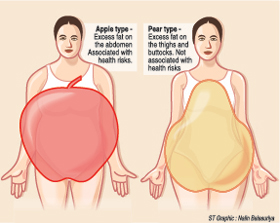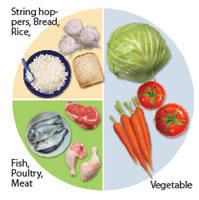Start now: Physiologically friendly living
Wife, mother and professional, Amali, is 40 years old. This happily-married bank executive who has two lovely adolescents should be contented.
However, she is stressed and exhausted all the time. To add to her state of mind, she is gaining weight. Although doctors have ruled out any serious illness, Amali is unhappy as she feels she is not in the best of health.

Why is she feeling so? A detailed analysis of Amali’s lifestyle brings into focus some key problems. They are:
Improper food habits – No regular meal times and eating ‘something’.
Sedentary lifestyle – Travels by car and sits at a desk for 9–10 hours a day.
Lack of adequate sleep – Goes to bed around mid-night and gets up at 5 a.m.
Too much stress, both at home and the workplace.
Amali needs to understand the importance of healthy living to optimise the normal physiological functions of the body and make life style modifications to reverse the negative impact on her health.
The important areas that she needs to look into are:
Maintaining a healthy weight and correct body proportions. A healthy weight is achieved by balancing the energy intake with the energy expenditure. As such, weight gain could be due to eating more or exercising less or a combination of both.
It is also known that weight control gets tougher when a person is between 30 and 60 years of age.
For Amali and for all adults, calculating the body mass index (BMI) is a simple way of checking whether the weight is satisfactory for the height. The BMI is calculated by dividing the body weight (measured in kilograms) by the square of the height (measured in metres). According to the World Health Organisation’s BMI criteria for Asians, an individual with a BMI of over 27 is considered obese.
Obesity is of concern as it is linked to many diseases such as diabetes mellitus, hypertension, ischaemic heart disease, stroke, osteoarthritis of knees and hips and increased risk of many cancers with the common sites being the breast, large intestine, rectum, oesophagus and kidney. The target BMI should be between 18.5 and 23.
Scientific research has shown that body fat accumulated in the abdominal area (producing a large waist circumference) is linked more to these diseases than the fat on the buttocks, hands and feet. This is because centrally-located fat cells are known to produce more harmful chemical substances (pro-inflammatory adipokines), while fat cells in the peripheries produce more healthy chemical substances (anti-inflammatory adipokines). When abdominal fat increases beyond a certain level, the balance is shifted towards inflammation which is the cause of a range of diseases.
To achieve a healthy weight and correct body proportions, one needs to keep active. The target is to keep the body’s metabolic processes running and burning calories continuously to prevent them from going to the fat-storing mode that causes unnecessary weight gain. To achieve this, exercises should be worked into the daily routine.
Aerobic exercises (walking, jogging, swimming or cycling) for 20 – 30 minutes per day for at least five days a week in addition to controlling weight, will provide additional benefits such as improving cardiovascular fitness. If formal exercises are difficult, engaging in simple measures like climbing the stairs instead of taking the elevator, walking the dog and walking to the grocery store will help.
Practising healthy food habits is important to maintain the right weight and improve general health. The diet should be carefully planned to have a balance of essential nutrients; carbohydrates, proteins, fats, vitamins and minerals.
Adequate amounts of fruits and vegetables should be consumed during meals. Plant foods are low in sodium and calories, fat free and rich in vitamins, minerals and fibre.

At least five portions of a variety of fruits and vegetables should be eaten every day. An easy way to assess whether a nutritionally balanced meal is being eaten is to look at the food plate. To be ‘healthy’, half of the plate should have vegetables, one quarter starch (rice, bread, yams, string hoppers etc) and the other quarter proteins (fish, meat, eggs etc.). Meal times should be regular and would help keep blood sugar levels stable, preventing strong feelings of hunger which could result in over-eating at the next meal.
Many underestimate the importance of water for the optimal functioning of the body. In an adult, water makes up to about 60% of the total body weight. Adequate hydration is important to optimise all physiological functions such as chemical reactions of cells, maintenance of body temperature, skin turgor, digestion, absorption of nutrients, circulation and excretion of wastes.
There is no set requirement of water per day. The daily water requirement will vary depending on the level of physical activity and environmental conditions. The colour of the urine gives a good indication on the state of hydration. If a person is well hydrated, the urine will be very light in colour.
Adequate sleep is an essential biological state which is like charging the batteries for the next day. Sleep restores physical and mental health by facilitating cell growth, repair of damaged cells etc.
Although sleep needs vary among individuals, an average adult requires around eight hours of sleep each night. Proper planning of the day and improving time management skills are needed to allocate more time for sleep.
Leading a relaxed life with good stress management skills is also important. In normal situations, stress is a protective response and a coping strategy to threat. However, constant stress puts health at risk. Long term activation of stress hormones leads to over-exposure to these hormones, the most important being adrenaline and cortisol. This will lead to the disruption of normal physiological mechanisms of the body leading to health problems.
Stress management is an important skill that has to be developed. Explore the causes of stress, analyse them carefully and take steps to change them to make them less stressful. It is important to understand one’s strengths and limits. Plan the day. Have a clear idea about priorities. Learn to delegate tasks to colleagues/family members.
With Amali deciding to make an attempt to change her lifestyle, she is feeling healthier and happier than before.
If, however, she continued with her unhealthy lifestyle, she would have been a good candidate for the development of non-communicable diseases such as ischaemic heart disease, hypertension, stroke, diabetes and cancers.
All of us dream of health, wealth and happiness. If our health gets compromised, both wealth and happiness fade away. No matter how busy life is, we owe ourselves a healthy lifestyle to optimize the physiological functions of our bodies.
PsSL celebrates 25 years
Physiology is a science which deals with the normal function of cells, tissues, organs and organ systems of your body. Thus it is called the ‘Science of Life’. Understanding the normal functions helps us to optimise them and thereby promote health.
Disruption of normal physiology leads to disease. Therefore physiology forms the foundation of all the medical disciplines that are needed to diagnose and treat disease.
The Physiological Society of Sri Lanka (PSSL) was founded by an eminent physiologist, Professor Valentine Basnayake in 1987 with the intention of encouraging research, disseminating knowledge and promoting fellowship among physiologists. The PSSL while celebrating its 25th anniversary this year will proudly host the third conference of the South Asian Physiologists (SAAP 3) from November 7 –10 in Colombo under the theme ‘Advances in Physiology: Trends and opportunities’.
The Sunday Times is the print media sponsor of the conference.
(The writer is a Senior Lecturer at the Department of Physiology of the Colombo Medical Faculty)
Follow @timesonlinelk
comments powered by Disqus

























